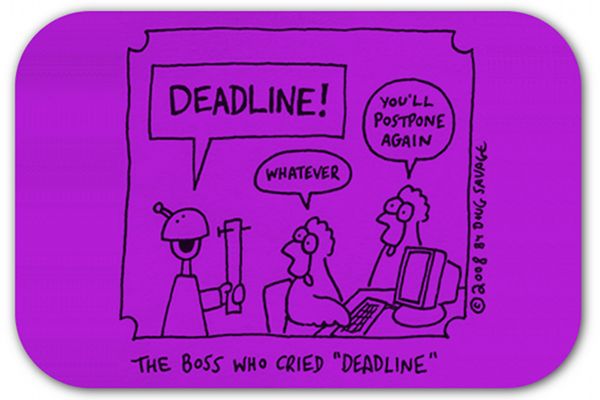Project Management: Seven Deadly Sins To Avoid
Mistakes are a part of life. Everyone makes them, including project managers. When you are responsible for a project, it is easy to get side-tracked or overwhelmed with so many things to take care of. Between the pressures of making sure that the project is completed on time and within budget, to managing the team and addressing issues, it is easy to make mistakes. In order to help you be a successful project manager, here are seven sins you should definitely avoid.
Lack Of Communication
If you want to be an effective project manager, the most important skill you need to have is effective communication. You will need to communicate with your executive management staff, your team and the customer. Create a communication plan at the start of your project and make sure that you stick to it throughout. This type of plan will ensure that everyone you are working with knows the expectations and has a clear understanding of what is going on. Make sure that everyone is clear that all formal communication needs to go through you, the project manager. This will help ensure that everyone is getting accurate information and that you are all working towards the same goals.
Consider having a weekly meeting with your team. This will provide you with the opportunity to quickly disseminate key information to everyone involved, as well as allow the team to feedback to one another. Clear communication will enable everyone to be up-to-date and to create a more positive and productive working environment. Make sure that you communicate progress and updates to your customer at the specified times, focusing on the important information. This will help you to keep customers engaged and improve customer confidence and satisfaction in your skills as a project manager.
Lack Of Authority
As the project manager it is up to you to make sure that the project is running as expected. That means that you have to keep a close eye on all the tasks and assignments that you have set your team. Chances are, you are working with high-quality professionals who are keeping on top of their tasks. But it is your job to check. Make sure that you talk to your team regularly and check that they have clearly understood the tasks you gave set them. It is part of your role to hold your team members accountable for their responsibilities within the overall project.
Your job encompasses checking that the project is progressing at the expected pace and within the budget. This means that you can’t be afraid to ask for updates from your team and be prepared to assert your authority when they are not producing the work you need or to the standard you expect. Team members are more likely to be open to feedback and suggestions if you have shown them that you are professional and have authority.
Remember, both your team and your customers will respect you more if you are consistent, fair and exercise your authority in such a way as to ensure that the integrity of the project is maintained.
Not Enough Planning
There are many reasons why you might feel the need to skip over the planning phase. Usually, it’s because you are working to tight deadlines and so reduce the amount of planning time in order to have more time once the project is actually up and running. Other reasons also include pressure, either from your executives or from customers themselves. However, not giving yourself – and the project – sufficient planning time can spell disaster for the overall project. At best, you will find that you are constantly making changes and adjustments and the project will be challenging and lack sufficient focus. At worst, you may find yourself going over budget and having to answer to unsatisfied customers and executives. Either way, lack of sufficient planning will make it harder for you to manage the project and make you look less professional and able than you actually are.
Make sure that you give yourself enough time to plan. Not only will careful planning help the project run more smoothly, but it will be more likely to stay on budget and finish at the estimated time. Moreover, it will allow you to foresee and plan for any potential risks and ensure that you are able to successfully meet the requirements of the project.
Unclear Project Scope
This stems from ensuring that you have clearly and carefully planned the project to begin with. Make sure that you clearly state the project’s scope at the very beginning. Everyone involved in the project needs to be clear about this. This should be decided and carefully planned for during the planning phase of the project. During the actual project itself, make sure that you keep the project’s scope focused. Avoid making changes to it once the project has started. Even minor changes can impact on the progress or success of your project. Regularly revising the project’s scope is likely to cause the project to overrun, both in terms of time and costs, and can ultimately lead to the project’s failure.
Unrealistic Deadlines
Part of your role as a project manager is to ensure that the project doesn’t overrun. Ideally, you want the project to stay within the budget and be completed by the set time. To this end, you need to set deadlines. Although you may feel that setting tight deadlines will keep your team focused and ensure their productivity, you may find the opposite to be true.
You need to set deadlines which are realistic and achievable. Yes, you can be ambitious, but it is important to be honest about the amount of time that is actually required to complete parts of the project to a good enough standard. If you set deadlines which are too tight, you may find that you have put too much pressure on your team. Not only will this cause dissatisfaction within the team, but it will likely cause stress which is not conducive to producing good quality work. Having missed deadlines regularly will create greater stress, as well as mistrust within the team. Moreover, it will undermine your authority and show poor planning on your part.
If you want your project to succeed, make sure that you set deadlines which are appropriate and achievable. Setting unrealistic deadlines to impress your customers or executives is more likely to be damaging to your project. Instead, plan carefully so that your project can be completed effectively and meet realistic expectations.
Disregarding Risks
Alongside effective planning, careful risk management is one of the most important areas you need to address. You need to know what the risks to your project might be. It is important to address these during your planning phase. By identifying potential problems and risks, you are able to put effective strategies in place to help you mitigate such risks. This kind of proactive approach means that you can take action early on and even remove any risks or threats before they are able to hinder the progress of your project. Moreover, assessing risks and having clear plans in place to deal with them, should they occur, will show effective management. Careful and pre-emptive risk management will allow you to run and execute your project more successfully.
Overlooking Customer Satisfaction
Customer satisfaction is critical. If you don’t pay enough attention to the level of your customer’s satisfaction, you may find your project becomes a failure. Equally, you don’t want to simply do everything the customer asks for because, sometimes, it may not be what is most beneficial to the overall project. Your job is to manage the customer. Remember that it is their money that is funding the project. You need to balance project management with great customer management. After all, if a customer is satisfied with the work you have done and how you have interacted with them, they are more likely to become a repeat customer.
The best way to ensure that your customer is satisfied to is keep them updated. This means having consistent and regular communication with them. Schedule weekly project meetings in which you update the customer on the project’s progress and stick to them. Make sure that you give the customer accurate status reports. That means you need to keep them aware of any issues or risks, as well as providing them with a budget update. Make sure that you inform them promptly of any issues that arise. You want to make sure that your customer feels well-informed and engaged throughout the project.
Summary
Your main aim as a project manager is to ensure that your project is completed to the best standard within the set time and within the budget. In order for this to happen you need to ensure that you have carefully planned the project and addressed any potential risks. You need to have established the project scope and set realistic deadlines and budget. Continue upskilling by learning through top online MPM programs to master this field and increase your effectiveness as a project manager.
In order to be a successful project manager, you need to have clear and regular communication with both your team and the customer. Keeping the customer and the team updated will ensure that all parties have trust in your management and you are all working towards the same goal.















![Winter and Christmas Style Guide [Infographic]](https://technofaq.org/wp-content/uploads/2016/12/Christmas-and-Winter-Style-Guide-150x150.jpg)






